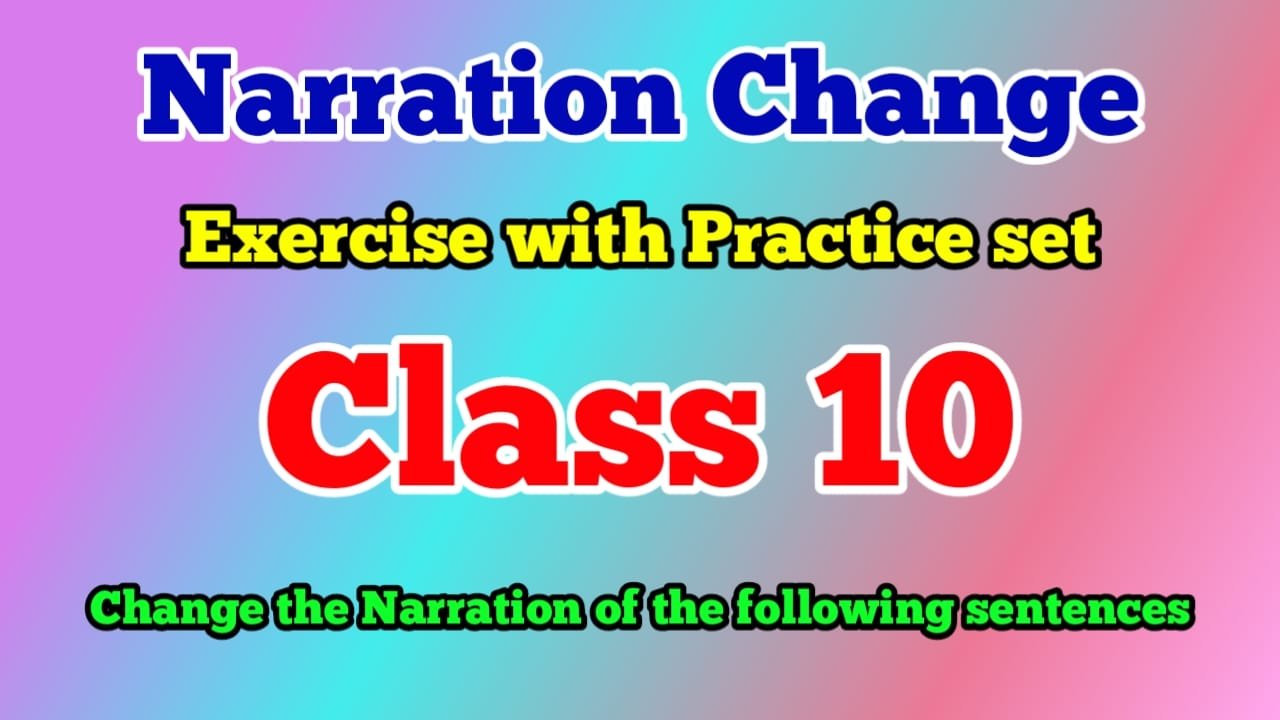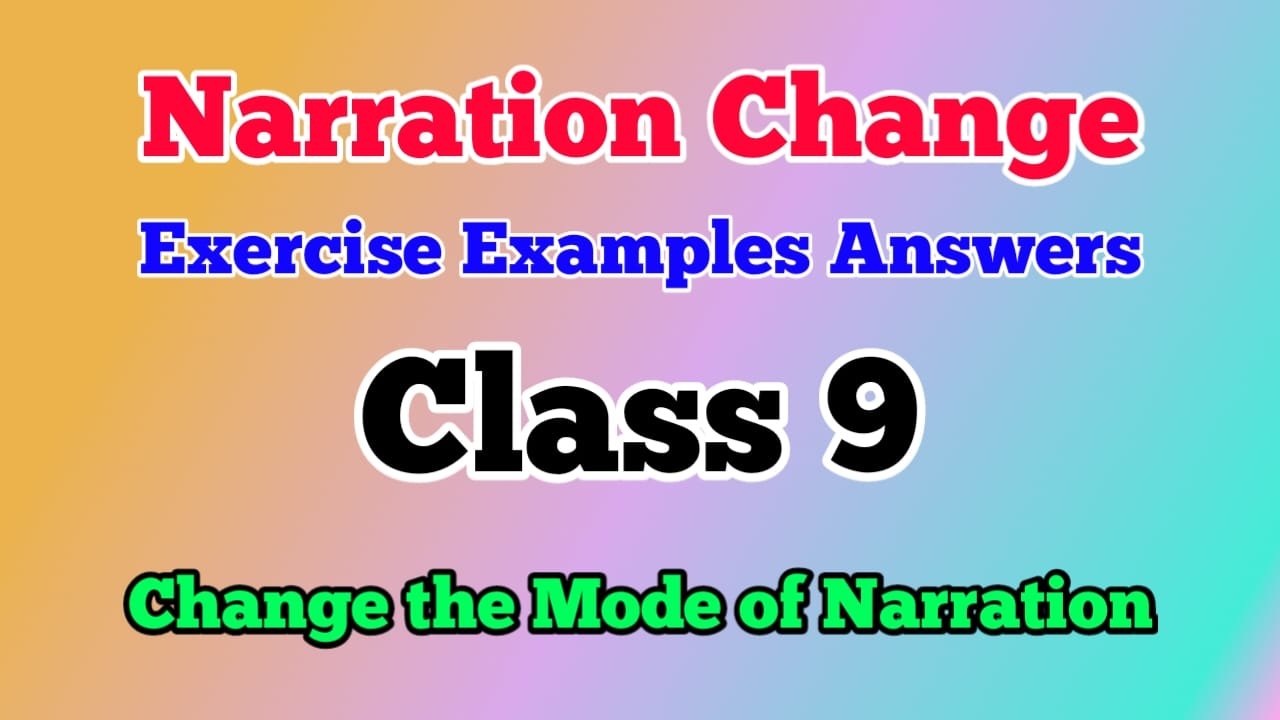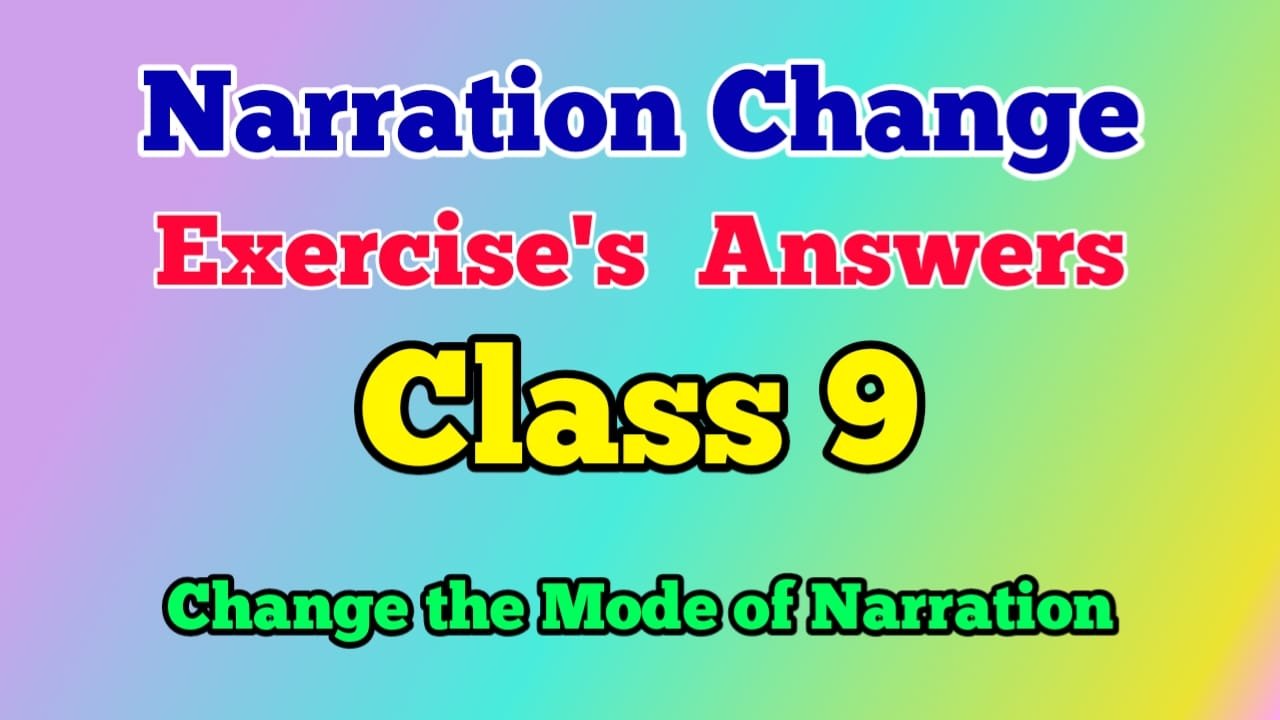Get a solid grasp on the Narration Change Class 10 Rules with Examples and Exercises in English with our comprehensive guide. Develop a thorough understanding of Direct and Indirect speech and how to convert one form to another with ease. This comprehensive guide will take your Class 10 English to the next level.
Narration in English Grammar
Narration in English grammar refers to the style or way of expressing a story or speech. It includes direct speech and indirect speech conveying spoken words or thoughts within a narrative context.
When someone quotes the Narrator’s actual words, it is called Direct Narration or Direct Speech. When the Narrator’s actual words are spoken indirectly by someone keeping the meaning the same without quotation, it is called Indirect Narration or Indirect Speech.
- Direct Speech: Rehana says, “I shall dance.”
- Indirect Speech: Rehana says that she will dance.
The learning of Narration Class 10 will be completed to grasp the change of narration from direct to indirect speech or vice versa.
Class 10 Narration Change
Narration change involves altering direct speech to indirect or vice versa.
Example:
Changing “She said, ‘I love this place‘” to indirect: “She said that she loved that place.“
Altering direct speech to indirect or vice versa, it is extremely important to know the Narration Change Rules.
So, explore the Narration Change Rules that have been discussed below with Examples and Exercises.
Rules of Narration Change Class 10
Narration Change Rules for class 10 are given below with Examples. To change the Narration of the following sentences, the Narration Change Rules must be kept in mind.
Narration Change Class 10 rules of Assertive sentence or Statement
Rule 1
- Direct Speech: Ram says, “I am ill.”
- Indirect Speech: Ram says that he is ill.
Connective ‘that’ is added before the reported speech in Indirect Narration.
Rule 2
- Direct Speech: He said, “I write a letter.”
- Indirect Speech: He said that he wrote a letter.
If reporting Verb is in the past Tense, the reported speech verb is also changed into the past tense. If reporting Verb is in the Present Tense or Future tense, the tense of the reported speech verb will remain as it is.
People also ask
| Narration Change Class 5 | Narration Change Class 8 |
| Narration Change Class 6 | Narration Change Class 9 |
| Narration Change Class 7 |
Rule 3
- Direct Speech: He said, “Honesty is the best policy.”
- Indirect Speech: He said that honesty is the best policy.
When Direct speech states Universal Truth or Habitual Fact, the Tense of the verb in reported speech will remain unchanged.
Rule 4
- Direct Speech: I said to him, “ You are not my friend.”
- Indirect Speech: He told me that he was not my friend.
(I, we, me, us) refers to the person of the speaker. (You, your) refers to the person of the man to whom the speech is addressed. (He, she, they, him, her, his, their) remain unchanged. N.B – ‘say to me’ = ‘tell me’, ‘say=say’, ‘said to me’ = ‘told me’
Narration Change Class 10 rules of interrogative sentences or Questions.
Rule 1
- Direct Speech: You said to me, “Do you hear me?”
- Indirect Speech: You asked or (enquired of) me if ( or whether) I heard you.
In Interrogative sentences or Questions without ‘wh-word’, ‘ask’ or ‘enquire of’ are used as reporting verbs. Connective ‘if’ or ‘whether’ placed before the reported speech.
Rule 2
- Direct Speech: He said to me, ‘When will you go?”
- Indirect Speech: He asked (enquired of) me when I would go.
For interrogative sentences or Questions with ‘wh-word’, add ‘wh-word’ instead of ‘if’ or ‘whether’ as connective.
Narration Change Class 10 rules of Imperative sentence or command or request.
Rule 1
- Direct Speech: He said to me, ‘Go home at once.”
- Indirect Speech: He ordered me to go home at once.
Imperative sentence reporting verbs should be used according to sense ‘order’, ‘request’, and ‘advise’. Connective ‘ to’ is placed before the reported speech verb.
Rule 2
- Direct Speech: He said to me, “Let us go home.”
- Indirect Speech: He proposed or suggested to me that we should go home at once.
When ‘Let’ and ‘us’ are used, reporting verbs will be ‘suggest’, and ‘propose’. Connective ‘that’ is used and ‘Let’ is changed to ‘should’.
Rule 3
- Direct Speech: He said, “Let me have some milk.”
- Indirect Speech: He wished that he might have some milk.
When ‘Let’ and ‘me/him’ are used, reporting verbs will be ‘wish’, ‘request’, and ‘tell’, according to sense. Connective ‘that’ is used and ‘Let’ is changed to ‘might / might be allowed to’.
Narration Change Class 10 rules of Optative sentence or Pray or Wish.
- Direct Speech: He said to me, “May you be happy.”
- Indirect Speech: He wished or (prayed ) that I might be happy.
Reporting Verb should be changed to ‘wish’, or ‘pray’. Connective ‘that’ is placed before the Reported speech verb.
N.B – This type of sentence is introduced with ‘May’
Narration Change Class 10 rules of Exclamatory sentence.
- Direct Speech: He said to me, “What a nice thing it is! ”
- Indirect Speech: He exclaimed in joy that it was a very nice thing.
Reporting verbs changed to ‘exclaim in joy ( with joy)’, ‘cry out’, ‘pray’, ‘wish’. ‘wh-word – who, how, what’ should be replaced by ‘ great’, ‘greatly’, ‘very’, ‘very much’, ‘big’ etc. Connective ‘that’ is placed before the reported speech.
Change the narration of the following sentences.
Now change the Narration of the following sentence. The Narration Change Exercise with the Practice Set for class 10 is given below. It is advised to consult with the Narration Change Rules given above.
Workout Examples of Assertive Sentences
Change the mode of narration of the following sentences.
(1) I said to him that I had once seen him before.
Ans: I said to him, “ I once saw you ago.”
(2) She said that she had a dream that night.
Ans: She said, “I have a dream tonight.”
(3) The boy said. “We were playing.”
Ans: The boy said that they had been playing.
(4) He told me that I should obey my parents.
Ans: He said to me, “You will obey your parents.”
(5) Amal said to Bimal, “I gave you, my pen.”
Ans: Amal told Bimal that he had given him his pen.
(6) She said, “It is money that matters.”
Ans: She said that it is money that matters.
(7) I told him that he would get it that day or the next day.
Ans: I said to him, “You will get it today or tomorrow.”
(8) He said, “Habit dies hard.”
Ans: He said that habit dies hard.
(9) Anu said that he had been writing a novel.
Ans: Anu said, “I have been writing a novel.”
(10) She said. “This life is not an empty dream.”
Ans: She said that life was not an empty dream.
Exercises of Assertive Sentences
Change the narration of the following sentences from direct to indirect and vice-versa.
(1) He told her that she had been a mere child when he saw her last.
Ans: He said to her. “You were a mere child when I saw you last.”
(2) You said to me, “As I do not know you, I cannot help you”
Ans: You said to me that as you did not know me, you could not help me.
(3) Fatema said to her father, “I shall be happy if you will put me to a college.”
Ans: Fatema said to her father that she would be happy if he would put her in college.
(4) I told her that she was right.
Ans: I said to her, “You are right.”
(5) He said that he had been ill the previous day.
Ans: He said, “I was ill yesterday.”
(6) I told him that the sky is blue that day.
Ans: I said to him, “The sky is blue today.”
(7) He said to me, “You are honest, so I shall play with you from tomorrow.”
Ans: He told me that I was honest, so he would play with me the next day.
(8) I told him that he was wrong.
Ans: I said to him, “You are wrong.”
(9) He said that he had come.
Ans: He said, “ I have come.”
(10) He said to you, “I was pleased.
Ans: He told you that he had been pleased.
Workout Examples of Interrogative Sentences
Change the narration of the following sentences from direct to indirect and vice-versa.
(1) Ram said, “What is your name?”
Ans: Ram asked what my name was.
(2) I said to him, “Did you go there?”
Ans: I asked him if he had gone there.
(3) He inquired of her if she had a good guitar.
Ans: He said to her, “Do you have a good guitar?”
(4) I said, “Are you writing a letter ?”
Ans: I asked if he was writing a letter.
(5) You asked me why I had failed.
Ans: You said to me, “Why have you failed?”
(6) She enquired if he would help her.
Ans: She said, “Will you help me?”
(7) He said to me, “Where do you live ?”
Ans: He asked me where I lived.
(8) I said to her. “Why are you so sad ?”
Ans: I asked her why she was so sad.
(9) “Why are you weeping then ?” asked he.
Ans: He asked why I was weeping, then.
(10) The boy said to me, “Why did you hurt me?”
Ans: The boy asked me why I had hurt him.
(11) “How did you get here, child ?” asked the lady.
Ans: The lady asked the child how he had got there.
(12) “Will you help me to move the piano? my aunt asked.
Ans: My aunt asked if I would help her to move the piano.
(13) “What does it matter if we do miss the train ?” said he.
Ans: He asked what it mattered if they missed the train.
(14) He said to us, “Are you coming to the meeting today?”
Ans: He asked us if we were coming to the meeting that day.
Exercises of Interrogative Sentences
Change the narration of the following sentences.
(1) “How can I do such a thing? said he.
Ans: He asked how he could do such a thing.
(3) He asked me where I had got it.
Ans: He said to me, “Where have you got it?”
(4) I said to him, “Where did you see me and what do you think of me?”
Ans: I asked him where he had seen me and what he thought of me.
(5) I asked the boy why he had failed in the exam and what he intended to do.
Ans: I said to the boy, “Why have you failed in the exam and What do you intend to do?
(7) They enquired about who I was and why I was opposing them that day.
Ans: They said to me, “Who are you, and why you are opposing us today.”
(8) He said to his father, “Will the next letter come tomorrow ?”
Ans: He asked his father if the next letter would come the next day.
(9) He said to her, “Who are you and what do you want of us?
Ans: He asked her who she was and what she wanted of them.
(10) I said to you, “Did you know why I liked you ?” to go.
Ans: I asked you if you knew why I had liked you.
(11) “Who was the first man to land on the moon ?” said the examiner.
Ans: The examiner asked who the first man was to land on the moon.
(12) You said to them, “Have you seen the girl who came to me this morning ?”
Ans: You asked them if they had seen the girl who came to you that morning.
Workout Examples of Imperative Sentences
(1) My friend said to me, “Go at once.”
Ans: My friend ordered me to go at once.
(2) I said to him, “Please explain the matter.”
Ans: I requested him to explain the matter.
(3) He said, “Let him do whatever he likes.”
Ans: He wished that he might do whatever he liked.
(4) I requested him to lend me a pen.
Ans: I said to him, “Please lend me a pen.”
(5) He wished that he might take a cup of tea.
Ans: He said, “ Let me take a cup of tea.”
(6) “Let us,” he said, “start today.”
Ans: He proposed that they should start that day.
(7) The girl begged her father to allow her to go to the cinema.
Ans: The girl said to her father, “Please allow me to go to the cinema.”
(8) The teacher said, “Boys. lend me your ears.”
Ans: The teacher ordered the boys to lend him their ears.
(9) I begged him to excuse me.
Ans: I said to him, “ Excuse me.”
(10) She said to him, “Father, excuse me this time.”
Ans: She begged her father to excuse her that time.
Exercises of Imperative Sentences
Change the narration of the following sentences.
(1) The old lion said to a fox, “Please come near me in my den.”
Ans: The old lion requested a fox to come near him in his den.
(2) He said, “Let us drop the matter.”
Ans: He proposed that they should drop the matter.
(3) “Do not think over the past”, advised I.
Ans: I advised you not to think over the past.
(4) The doctor said, “Take medicine twice today.”
Ans: The doctor advised me to take medicine twice that day.
(5) “Halt!” shouted the officer to his men.
Ans: The officer shouted to his men to halt.
(6) The boy said, “Sir, please grant me leave.”
Ans: The boy requested to grant him leave.
(7) Lata said to me, “Let me try.”
Ans: Lata wished me that she might try.
(8) I requested them to speak to their officer about my prayer.
Ans: I said to them, “Please speak to your officer about my prayer.
(9) She forbade the boys to go there.
Ans: She said to the boys, “Don’t go there.”
(10) “Do to others as you would like them to do to you”, said the saint.
Ans: The Saint advised to do to others as I would like them to do to me.
(11) God said, “Let there be light.”
Ans: God wished that there should be light.
Workout Examples of Optative Sentences
(1) The saint said to her, “May you live long.”
Ans: The Saint wished her that she might live long.
(2) He prayed that his soul might rest in peace.
Ans: He said, “May your soul rest in peace.”
(3) He said to the woman, “ May you have a son.”
Ans: He wished that woman that she might have a son.
(4) He said to me, “May you be happy.”
Ans: He wished me that I might be happy.
(5) I said to him, “May you all succeed.”
Ans: I wished him that he might all succeed.
(6) He said to you,” May God bless you.”
Ans: He wished you that God might bless you.
(7) The monk said, “May God pardon the sinner.”
Ans: The monk wished that God might pardon the Sinner.
(8) She cursed me that I might be ruined.
Ans: She said to me, “May you be ruined.”
(9) The teacher wished that the boys might all pass.
Ans: The teacher said, “May the boys might all pass.”
(10) The old lady said to me, “May God grant you long life.”
Ans: The old lady wished me that God might grant me long life.
Exercises of Optative Sentences
Change the narration of the following sentences from direct to indirect and vice-versa.
(1) She wished that I might prosper in life.
Ans: She said, “ May you prosper in life.”
(2) I said to him, “May you have the happy return of this day.”
Ans: I wished him that he might have a happy return on that day.
(3) He said, “May your children live in plenty.”
Ans: He wished that my children might live in plenty.
(4) He said to us, “ May you all succeed in life.”
Ans: He wished that we might all succeed in life.
(5) He said, “ Had I the means to do it.”
Ans: He wished that he had the means to do it.
(6) Mother said to her, “may your dreams come true.”
Ans: Mother wished her that her dreams might come true.
(7) They said, “Long live the leader.”
Ans: They wished that the leader might live long.
(8) Mother said to me,” May you have peace and prosperity in life.”
Ans: Mother wished me that I might have peace and prosperity in life.
Workout Examples of Exclamatory Sentences
(1) He said, “Alas! I am done for !”
Ans: He cried out in sorrow that he was undone.
(2) He said, “What a stupid fellow you are !”
Ans: He exclaimed that I was a very stupid fellow.
(3) He said, “Goodbye my friends !”
Ans: He bade his friends goodbye.
(4) I said to him, “How happy you are !”
Ans: He told me that I was very happy.
(5) He said, “What was my joy to see you !”
Ans: He said that his joy to see me was very great.
(6) She said, “What a pity you did not come !”
Ans: He exclaimed in sorrow that it was very pity that he did not come.
(7) He said to me, “How obliged we are to you !”
Ans: He exclaimed in gratitude that they were very obliged to me.
(8) “Goodnight to you all”, said I.
Ans: I wished goodnight to them all.
(9) She exclaimed that the moon was very nice.
Ans: She said, “How nice the moon is!”
(10) The spectators shouted, “Bravo! well played.”
Ans: The spectators applauded saying that they had played well.
Exercises of Exclamatory Sentences
Change the narration of the following sentences.
(1) “So, help me, Heaven !” she said, “I will never sin.”
Ans: She prayed to Heaven to help him in his resolve no to sin.
(2) “Alas! child,” said the mother, “I have a bit of bread to give you.”
Ans: The mother cried out in sorrow that she had a bit of bread to give the child.
(3) You said, “How nice the lake is !”
Ans: You exclaimed in joy that the lake was very nice.
(4) I said to him, “What a nice fellow your friend is !”
Ans: I told him that his friend was a very nice fellow.
(5) He said with joy what a good news it was.
Ans: He said, “What a good news it is!”
(6) He said, “Had I meant to do it!”
Ans: He wished that he had the means to do it.
(7) She observed that the house was very dirty.
Ans: She said, “ How dirty the house is !”
(8) “What a fool you are !” said the teacher.
Ans: The teacher cried out that I was a great fool.
(9) She said to me, “Happy birthday.”
Ans: She wished me happy birthday.
(10) I said to him, “By God! I never meant you any harm.”
Ans: He swore in the name of God that he never meant him any harm.







